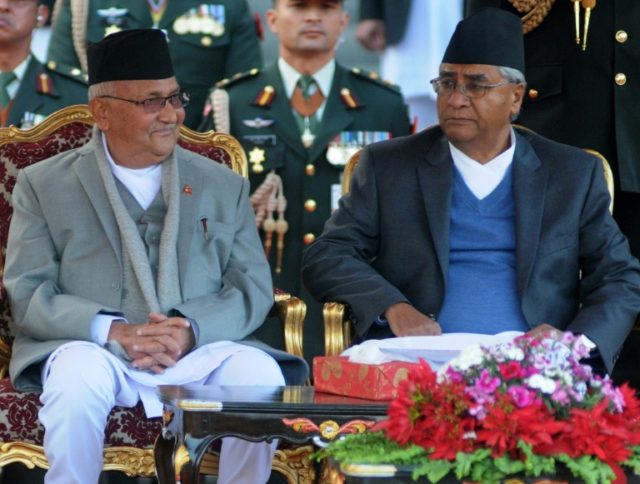Khadga Prasad Sharma Oli, the recently elected Communist prime minister of Nepal, said in his first official interview on Monday that he wants to restart a Chinese-led hydroelectric project valued at $2.5 billion as part of a strategy to realign his country away from India and toward China.
“Political prejudice or pressure from rival companies may have been instrumental in the scrapping of the project. But for us, hydropower is a main focus and come what may, we will revive the Budhi Gandaki project,” said Oli, who was sworn in last Thursday.
The South China Morning Post explains that the Budhi Gandaki dam project was pitched last year as part of China’s “Belt and Road” infrastructure initiative and approved by Prime Minister Pushpa Kamal Dahal, also a member of the Communist Party of Nepal.
Dahal resigned after only nine months in office, as part of a rather unusual (for anywhere but Nepal, at least) power-sharing arrangement with the Nepali Congress party, whose president Sher Bahadur Deuba took over as PM until the next election.
Deuba’s administration canceled the dam project in November due to alleged “irregularities with the Chinese company,” a decision widely seen as either an effort to develop better relations with China’s rival India and the United States, or India persuading Deuba to scuttle the project by pointing to Sri Lanka’s unhappy experience with Chinese “debt traps.” The Times of India suggested suspension of the project might even have been viewed as an early success of the U.S.-India-Japan-Australia alliance to provide “alternatives” to China’s Belt and Road infrastructure plan.
Oli, who is seen in Nepal as a “moderate Communist,” managed to form a working political alliance with the really hardcore Maoists and sweep the elections in December, winning his second term as prime minister after previously holding the office in 2016. To the great pleasure of China, this new coalition seems on the verge of becoming an enduring Communist majority that can bring Nepal more fully into Beijing’s orbit.
Oli has blamed Indian influence for bringing down his first administration, in part because India objected to certain elements of Nepal’s new constitution. Many Nepalese resent economic sanctions India leveled against their country at the time, which helped propel Oli’s coalition to victory in the last election.
A sticking point for that strategy is that Nepal is heavily dependent upon Indian oil, and its petroleum usage has increased 300 percent over the past five years. This explains the political significance of the Budhi Gandaki energy project.
“Our petroleum usage has been increasing but we import all of it. We urgently need to develop hydropower to reduce our dependence on petroleum,” Oli said during his interview on Monday.
Oli was conciliatory towards India in his interview, insisting it has always enjoyed “excellent relations” with Nepal and his problems are with “some elements in the Indian establishment” rather than the entire nation. He expressed confidence that India would not interfere in Nepalese politics in the future, despite India’s growing alarm over China either wooing India’s regional allies or economically strong-arming them into compliance with the Belt and Road plan.
Oli attributed his country’s dependence on India to an accident of geography and said that while he hopes to “increase connectivity” with India even further, technology now makes it possible to “reimagine distance” and establish much closer ties with China. In addition to the hydroelectric project, he mentioned rail transportation and cyber connectivity as areas for development. The South China Morning Post points out that until just last month, Nepal was dependent on India for Internet service, but has now created its own optical cable network.
“We live in a new world, and Nepal is starting a new journey, we have to update whatever is considered outdated and bring it in line with the modern era,” Oli concluded.

COMMENTS
Please let us know if you're having issues with commenting.